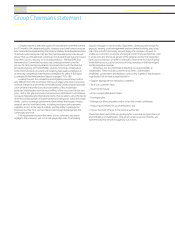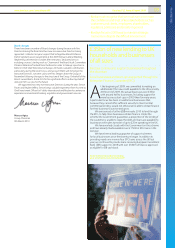Barclays 2009 Annual Report Download - page 20
Download and view the complete annual report
Please find page 20 of the 2009 Barclays annual report below. You can navigate through the pages in the report by either clicking on the pages listed below, or by using the keyword search tool below to find specific information within the annual report.
18 Barclays PLC Annual Report 2009 www.barclays.com/annualreport09
Group Chief Executive’s review
continued
The overall quantum of compensation we pay is designed to ensure
that we exceed the FSA’s minimum capital requirements at all times. We
understand how important it is to our shareholders that we maintain Core
Tier 1 ratio well in excess of regulatory minima. A direct and intended
consequence of our decisions on pay has been the further strengthening
of this ratio. Meanwhile, we have been able to meet the commitment that
we announced in April 2009 to resume dividend payments and we seek to
ensure that we manage the business in such a way (including in relation to
compensation) as facilitates the adoption of a conservative but progressive
dividend policy.
Our approach to the UK Bank Payroll Tax since the tax was announced
in December last year has been to manage the compensation pool in such
a way that the cost of the tax to the Group broadly equates to a reduction in
the size of the pool, with the reduction being borne by senior executives.
The cost to the Group of the UK Bank Payroll Tax in respect of 2009 cash
compensation is £190m, and £35m in respect of certain prior year awards
which may fall within the proposed legislation. Where a liability arises in
subsequent years, we will follow the same approach.
2010 strategic framework
The economic outlook remains uncertain. The worst of the financial crisis is
behind us, but the environment remains unpredictable, and for that reason,
we have to be very clear about the strategic framework in which we will be
doing business in 2010 and beyond. The principal components are as
follows:
1. We will continue to act as responsible corporate citizens. We will ensure
that our wider responsibilities to society are reflected in how we act. To
the extent consistent with what is required of us by our regulators and
with our obligations to shareholders, we will continue to play our part as
a source, via service to customers and clients, of economic growth and
job creation in the geographies in which we operate. We must behave
constructively to help our customers and clients as they cope with the
economic downturn and to support governments and supervisors as
they deal with the effects of the financial crisis.
2. We will ensure that we maintain a sound financial and organisational
footing that anticipates and adapts to the regulatory changes that will
be required from us. The Basel authorities announced a package of
proposed reforms in December on which they are consulting. We are
working hard to advocate regulatory consistency; to ensure that the
cumulative impact of intended reforms on the economy is well
understood, and to ensure the reforms are implemented over sufficiently
extended transitional periods to enable the banking industry to support
economic growth and job creation. We will be obliged to accommodate
such changes as are finally enacted over the coming years and we will
have the ability over the period to take mitigating actions. Meanwhile,
we are seeking to anticipate many of the changes that may be required
of us in the areas of capital, leverage and liquidity. It is within our power
to be net generators, rather than consumers, of capital, which our
performance in 2009 demonstrates. We will maintain high levels of
liquidity, and we will be very attentive to the size and composition of our
balance sheet. In particular, we will manage leverage tightly, and we will
seek to bring down, over time, our loan to deposit ratio. Stress testing has
been institutionalised across Barclays in recent years. This is also now
part of the FSA supervision cycle. We will ensure that we continue to
monitor regularly our responsiveness to changing economic, market and
operational environments and align our views with those of our regulator.
3. We have recommenced dividend payments in accordance with our
prior commitments. We will make three quarterly fixed payments in
2010 and a final variable payment relating to the calendar year 2010
in March 2011. Given uncertainty about the full consequences of
regulatory reform, prudence dictates that our dividend policy should
be conservative. But, subject to that caveat, we intend our dividend
policy to be progressive relative to a 2009 annualised dividend of
4.5 pence per share.
4. Our allocation of capital across the Group will continue to be made on
both an economic and strategic basis, reflecting our goal of increasing
the international diversification of our income sources in the pursuit of
medium-term growth. So we will nurture Barclays Wealth, Barclays
Corporate, Absa and GRB, whilst ensuring that Barclays Capital takes
advantage of the structural changes in the investment banking sector.
2010 will be another year, however, in which we put returns before growth,
and where prudence will determine our approach to balance sheet size.
5. Notwithstanding the regulatory uncertainty which colours the goals I have
described so far, we must deliver another year of significant profitability.
The balance of earnings is also important to us, and we continue over
time to target two-thirds of our profits coming from GRB, Absa, Barclays
Wealth and Barclays Corporate and one-third from Barclays Capital.
Since its establishment in 1991, Absa has
grown into a well-diversified financial
services group and although 2009 has
been a test of our resilience as an
organisation, I am satisfied that we have
delivered solid underlying performance, improved
our risk management and continued to
strengthen our balance sheet. Absa maintains a
strong capital base and is well positioned for
future growth. During the year we launched our
‘One Absa’ strategy which aims to drive an
integrated approach across all of our businesses
so that our customers are serviced in a seamless
manner. Our strategic objectives are supported by
four key pillars:
– Achieving sustainable growth in targeted
markets;
– Embedding balance sheet optimisation and
proactive risk management;
– Ensuring a simple streamlined Group for
customer delivery; and
– Instilling a customer and people centred ethos
in our organisation.
Implementation of the strategy is a key priority
and in this regard we have reorganised the top
management team to drive a disciplined focus
on delivery. With the economic prospects in
2010 expected to remain uncertain, we are
confident that our strategy is robust and
positions us well to capitalise on the growth
opportunities that emerge.
Maria Ramos
Group Chief Executive
Absa Group Ltd
Absa
























